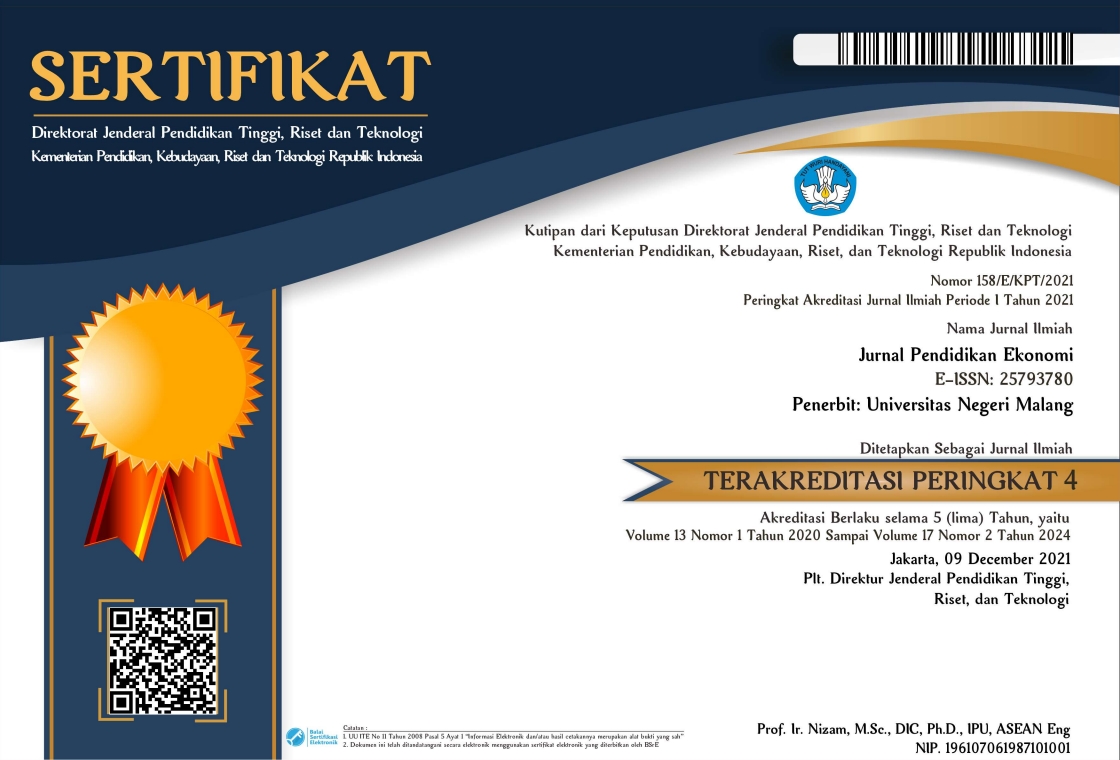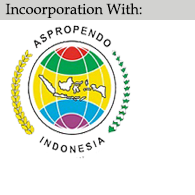KONTRIBUSI GAYA BELAJAR PADA AKTIVITAS BELAJAR MATEMATIKA EKONOMI
Abstract
Learning activities are consisted of two types which are active learning activities and passive learning activities. Learning activities are assumed has a connection with learning style. It is known on a condition when students learn economy mathematic with their own characteristic. Furthermore, the aim of this research is to know an impact or influence of visual style, auditory, kinesthetic, and read style of learning toward economy mathematic learning activity. This research involves 167 students. The result of this research shows visual learning style and auditory learning style are not give any influence to the economy mathematic learning activity, meanwhile kinesthetic and read learning style give an impact or influence toward the economy mathematic learning activity. Simultaneously, visual learning, auditory learning, kinesthetic learning, and read learning style have a significant influence toward economy mathematic learning activity. The result of this research can be a reference for the further research.
DOI: https://dx.doi.org/10.17977/UM014v12i22019p78
Keywords
Full Text:
PDFReferences
Abidin, M. J. Z., Rezaee, A. A., Abdullah, H. N., & Singh, K. K. B. (2011). Learning Styles and Overall Academic Achievement in a Specific Educational System. International Journal of Humanities and Social Science, 1(10), 143–152.
Gilakjani, A. P. (2012). Visual, Auditory, Kinaesthetic Learning Styles and Their Impacts on English Language Teaching. Journal of Studies in Education, 2(1), 104–113. https://doi.org/10.5296/jse.v2i1.1007
Gilakjani, A. P., & Ahmadi, S. M. (2011). Paper title: The Effect of Visual, Auditory, and Kinaesthetic Learning Styles on Language Teaching. International Conference on Social Science and Humanity, 5, 469–472. https://doi.org/https://doi.org/10.1111/j.1461-0248.2011.01660.x
H. Mulder, R. (2013). Exploring feedback incidents, their characteristics and the informal learning activities that emanate from them. European Journal of Training and Development, 37(1), 49–71. https://doi.org/10.1108/03090591311293284
Ibrahim, R. H., & Hussein, D. A. (2015). Assessment of visual, auditory, and kinesthetic learning style among undergraduate nursing students. International Journal of Advanced Nursing Studies, 5(1), 1. https://doi.org/10.14419/ijans.v5i1.5124
Joy, S., & Kolb, D. A. (2009). Are there cultural differences in learning style? International Journal of Intercultural Relations, 33(1), 69–85. https://doi.org/10.1016/j.ijintrel.2008.11.002
Klašnja-Milićević, A., Vesin, B., Ivanović, M., & Budimac, Z. (2011). E-Learning personalization based on hybrid recommendation strategy and learning style identification. Computers and Education, 56(3), 885–899. https://doi.org/10.1016/j.compedu.2010.11.001
Leasa, M., Corebima, A. D., Ibrohim, & Suwono, H. (2017). Emotional intelligence among auditory, reading, and kinesthetic learning styles of elementary school students in Ambon-Indonesia. International Electronic Journal of Elementary Education, 10(1), 83–91. https://doi.org/10.26822/iejee.2017131889
Leksono, A. W., Vhalery, R., & Maranatha, S. (2018). Cooperative Learning Model: The Power of Two Vs Tea Party. International Journal of Research & Review (Www.Ijrrjournal.Com), 5(12), 80–88. https://doi.org/http://www.inrein.com/10.4444/ijrr.1002/857
Milistetd, M., Ciampolini, V., Mendes, M. S., Cortela, C. C., & Nascimento, J. V. do. (2018). Student-coaches perceptions about their learning activities in the university context. Revista Brasileira de Ciencias Do Esporte, 40(3), 281–287. https://doi.org/10.1016/j.rbce.2018.03.005
Neuhauser, C. (2010). Learning Style and Effectiveness of Online and Face-to-Face Instruction. American Journal of Distance, 16(2), 99–113. https://doi.org/10.1207/S15389286AJDE1602
Nofriansyah, Martiah, A., & Vhalery, R. (2018). The Effect Of Learning Model Logan Avenue Problem Solving Heuristic To The Student’s Learning Activity. International Journal of Scientific and Research Publications, 8(10), 279–286. https://doi.org/10.29322/IJSRP.8.10.2018.p8236
Özbaş, S. (2013). The Investigation of the Learning Styles of University Students. The Online Journal of New Horizons in Education, 3(1), 53–58. Retrieved from http://www.crlt.umich.edu/sites/default/files/resource_files/CRLT_no10.pdf
Paisal, K. (2015). Learning Activities that Promote Ability the Proof Groups Using the Internet Network. Procedia - Social and Behavioral Sciences, 197, 1661–1664. https://doi.org/10.1016/j.sbspro.2015.07.216
Riener, C., & Willingham, D. (2010). The Myth of Learning Styles. Change: The Magazine of Higher Learning, 42(5), 32–35. https://doi.org/10.1080/00091383.2010.503139
Rohrer, D., & Pashler, H. (2012). Learning styles: where’s the evidence? Medical Education, 46, 34–35. https://doi.org/10.1111/j.1365-2923.2012.04273.x
Shephard, K. (2008). Higher education for sustainability: Seeking affective learning outcomes. International Journal of Sustainability in Higher Education, 9(1), 87–98. https://doi.org/10.1108/14676370810842201
Singh, V. (2017). Exploring the Relationship between cognitive Style and learning Style with Academic Achievement of Elementary School learners. Educational Quest- An International Journal of Education and Applied Social Sciences, 8, 413. https://doi.org/10.5958/2230-7311.2017.00084.8
Surjono, H. D. (2011). The design of adaptive e-Learning system based on student ’ s learning styles. International Journal of Computer Science and Information Technologies (IJCSIT), 2(5), 2350–2353.
Vhalery, R., & Nofriansyah, -. (2018). Cooperative Learning in the Learning Activity of Students. International Journal of Scientific and Research Publications (IJSRP), 8(9), 62. https://doi.org/10.29322/IJSRP.8.9.2018.p8110
Woerkom, M. van, & Croon, M. (2009). The relationships between team learning activities and team performance. Personnel Review, 38(5), 560–577. https://doi.org/10.1108/00483480910978054
Refbacks
- There are currently no refbacks.

Jurnal Penddidikan Ekonomi is licensed under a Creative Commons Attribution-NonCommercial-ShareAlike 4.0 International License





